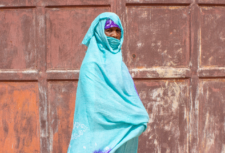Disclaimer: This article is more than 9 years old, and may not include the most up-to-date information or statistics. Please verify information with more recent sources as needed, and if you have any questions contact our Press Office.
30 September 2014
Each year the Government of Uzbekistan mobilizes millions of Uzbek citizens to participate as forced laborers in the state-run cotton harvest. Anti-Slavery International and our partners from the Cotton Campaign, attempted to hand in a petition with over 2,700 signatures to the Uzbek embassy in London but they did not want to talk to us, so we were forced to throw the envelope with the petition onto the embassy’s doorstep.
The letter read:
Dear President Karimov and relevant Uzbek leaders:
Out of concern for the citizens of Uzbekistan, I urge you to end the use of forced labor of children and adults in the cotton sector.
Yours is the only government in the world that systematically forces its citizens to produce cotton, under threat of punishment, as a matter of state policy. This practice violates fundamental human rights and condemns Uzbekistan to a cycle of under-development as generations are denied education, health-care and decent work opportunities.
The time to end state-orchestrated modern-day slavery in Uzbekistan is now. We urge you to take the following steps immediately:
1. Instruct government officials and citizens acting on behalf of the government to not coerce anyone to pick cotton and prosecute those who do;
2. Set the price for raw cotton above production costs so farmers can hire workers and set minimum wages for work in the cotton sector sufficiently high to attract voluntary labor;
3. Allow all human rights organizations, activists and journalists to investigate and report on the cotton sector without the threat of retaliation;
4. Permit unfettered access for the ILO to conduct a survey of the application of ILO Convention No. 105 on the Abolition of Forced Labour, with the participation of the International Organisation of Employers and International Trade Union Confederation; and
5. Reform the cotton sector, including by reporting all state expenditures and revenues from the cotton sector to the Uzbek Supreme Assembly (OliyMajlis), ending the practice of re-allocating agricultural lands as a penalty against farmers who do not fulfill cotton quotas, replacing quotas with incentives, and de-monopolizing agriculture input markets and sales markets.





